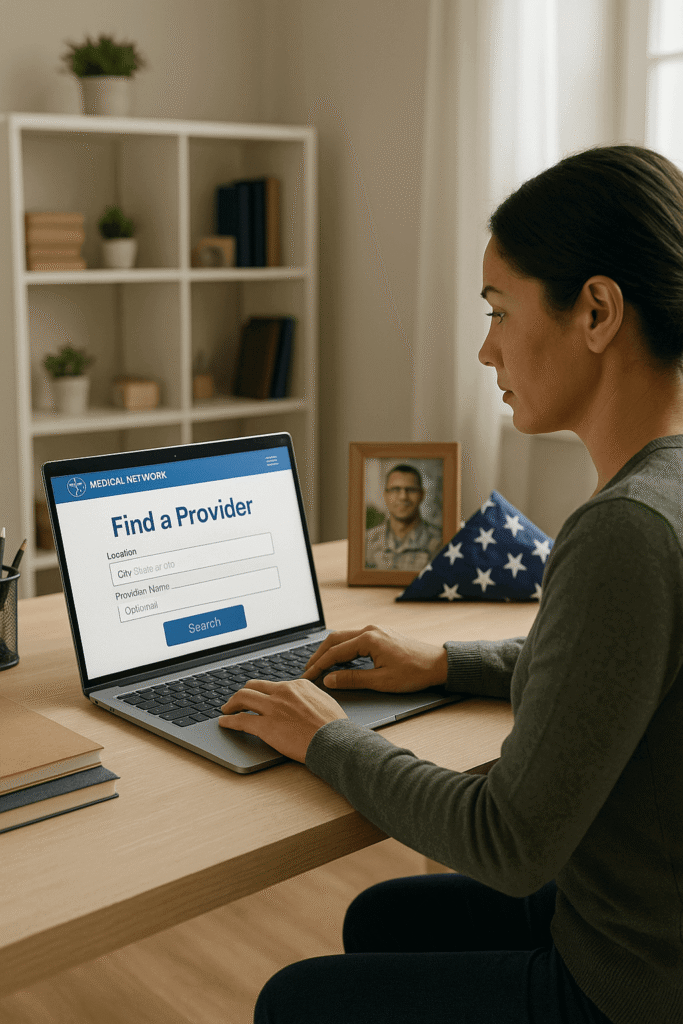Does TRICARE cover marriage counseling?
Well, yes, only with several conditions. In general, TRICARE will pay for couples or marriage counseling when it is a part of treating a diagnosed mental health condition in one or both spouses. In case it is a mere general improvement of relationships, and there is no diagnosis, it is not covered.
As Anna Welch, a U.S. citizen who’s spent years helping military families navigate TRICARE’s rules, I know how confusing the system can be. Between plan requirements, referral processes, and finding an authorized provider, it’s easy to feel lost.
In this blog, I’ll cover who qualifies, which mental health issues make counseling eligible, how to find a provider, the coverage process, costs, and online therapy options.
What is TRICARE?
TRICARE is the United States Department of Defense’s Official Health Care Program for its members, retirees people and the families of the military. It caters to on-duty service personnel, National Guard, and Reserve personnel, qualifying veterans, and survivors. TRICARE is not bare bones medical care, but provides coverage of a vast variety of medical, dental, vision, mental health treatment, and specialty care. The program is based on work with military treatment facilities and civilian providers, depending on your location and plan type.
Learning TRICARE work functions is important since the TRICARE coverages, when providing services such as marriage counseling, are highly specific. Being aware of the rules beforehand may save you time, money, and frustration when you want assistance in the relationship.
Only Diagnosed Mental Health Covered

You may well be asking yourself whether TRICARE will cover marriage counseling because you and your spouse would like to work on your relationship. The brief answer is no. Counseling to help improve your relationship, learn how to communicate with one another, or receive premarital counseling is not covered by TRICARE. The overall condition is that TRICARE will only compensate for marriage or couples counseling about a recognized mental health disorder in one or both partners.
As a military helper myself, this appears to be the most common cause of people’s downfall. They assume marriage counseling is treated like any other preventive health service, but TRICARE treats it as a mental health intervention, and that means there must be a documented, diagnosable condition.
What This Means for You
- One of the partners has to be assessed and have a mental health condition, at least depression, anxiety, PTSD, substance use disorder, or adjustment disorder.
- Couples counseling should be medically required and recommended by a mental health provider sanctioned by TRICARE in the treatment program.
- Your provider must document how the therapy supports the treatment of that diagnosis.
- If there’s no diagnosis, you’ll have to pay out of pocket for marriage counseling.
Why TRICARE Has This Rule
TRICARE is a health insurance program that is operated by the government, and similar to the majority of other health insurance plans, it only covers this or that types of services which is deemed to be medically necessary. General relationship problems, though very real and quite important, do not come up to that criterion unless they are associated with a well-defined mental health problem.
Example Scenarios
- Covered: Your spouse was diagnosed with PTSD, and your mental health doctor suggests that couples counseling would assist in communicating and supporting you during the treatment time.
- Not Covered: You and your partner are disagreeing more, and you both want to fix your marriage, but neither of you has a diagnosable mental health issue.
Read Also: How to Deal With Infidelity Guilt
How Ready Are You for Marriage?
20 honest questions, pick the option that fits you best.
Who Qualifies?
TRICARE’s marriage counseling coverage isn’t open to just anyone; you have to be eligible under their health program.
From my perspective, here’s exactly who can qualify:
- Active Duty Service Members: While you serve, you are covered by TRICARE. Your spouse is also covered.
- Retired Service Members: You and your spouse can continue to have coverage during retirement when you continue enrolling in TRICARE.
- National Guard & Reserve Members: You and your dependents are covered, provided you are on active duty orders or are eligible under TRICARE Reserve Select.
- Survivors: As the surviving spouse of an active service member, eligible to get TRICARE you are not denied benefits.
- Retired Members, Medically: They and their families are freely provided with full, including mental health, coverage.
The main point? You must be officially enrolled in a TRICARE plan; without that, there’s no access to any mental health coverage.
Check Also: How Well Do You Know Your Partner?
Which Mental Health Issues Qualify?
Marriage or couples counseling will be covered by TRICARE only in the presence of a diagnosed and treatable mental health condition within one or both spouses.
Here are only some of the most common conditions under which the door to coverage opens:
- Post-Traumatic Stress Disorder (PTSD): This is connected with military jobs, trauma, or combat-related experiences.
- Depression: These include major depressive disorder; persistent depressive disorder.
- Persistent stress and worry about daily interactions and activities are signs of generalized anxiety disorder (GAD).
- Adjustment Disorders: Failure to cope with such severe life changes as migration or deployment.
- Substance Use Disorders: Alcohol or drug dependence, and the use of couples therapy as a part of recovery.
- Other diagnoses of the DSM-5: Examples of these are bipolar disorder, panic disorder, among others.
If you or your spouse isn’t sure whether your symptoms fit these categories, you’ll need a mental health evaluation. The first step toward TRICARE coverage is the diagnosis.
Finding an Authorized Provider

You will have to use the services of a TRICARE-authorized person, not an arbitrarily selected local therapist.
Who is Authorized?
- LMFTs: Licensed Marriage and Family Therapists
- LCSWs: Licensed Clinical Social Workers
- PhD/Psy D Clinical Psychologists
- MD or DO psychiatrists
How to Find One:
- Visit the TRICARE Find a Doctor Tool on their official website.
- Select “Mental Health” as your specialty.
- Filter by your TRICARE plan (e.g., Prime, Select).
- Confirm that they indeed practice couples therapy in the mental health treatment regime.
In my personal experience, I would advise calling the office of any provider before booking and asking about being in-network, as this will save a headache later.
Referral Required?
The answer depends on your TRICARE plan:
- TRICARE Prime:
- Usually requires a referral from your Primary Care Manager (PCM) to any mental health specialist.
- Without it, you risk higher costs or complete denial of coverage.
- TRICARE Select:
- No referral needed, but the provider still must be TRICARE-authorized.
- Active Duty Service Members:
- In any non-emergency specialty, mental health care always requires referral.
Note: Although your plan may not need any referral, you should still know how to tell your PCM, as that would help your medical record represent the care.
Read Also: Is Marriage Counseling Covered By TRICARE?
Getting Covered: Step-by-Step Process
Here’s the path I recommend if you want TRICARE to cover your marriage counseling:
- Talk to Your PCM: Explain your relationship struggles and how they’re affecting your mental health.
- Get a Mental Health Evaluation: This step determines if there’s a qualifying diagnosis.
- Get a Referral (where necessary): Paperwork taken care of by your PCM or mental health provider.
- Select a TRICARE- Authorized Provider: Make sure they are in-network and provide couples treatment.
- Participate in Counseling: This is the most effective way to keep to the treatment schedule.
- Follow up on the coverage after the First Session: phone TRICARE or log on online to make certain that the claim was filed.
Read Also: Free Dating For Disabled People
Copays and Costs
TRICARE coverage reduces costs dramatically, but it’s not always 100% free.
- TRICARE Prime:
- $0 copay for active duty members
- Small copay for retirees and dependents
- TRICARE Select:
- Copays vary based on the sponsor’s status (active duty vs. retired) and provider network
- Lower costs for in-network providers
- Out-of-Network Care:
- Higher costs and possible denial of full coverage
Advice from me: Always double-check the provider’s status before your first session to avoid surprise bills.
Read Also: Premarital Counseling Christian
Online Therapy: Talkspace

Online therapy, which may involve couples therapy, is offered by TRICARE in collaboration with Talkspace.
Why it’s worth considering:
- Sessions via secure text, audio, or video calls
- Great for geographically separated couples or those on deployment
- Flexible scheduling with licensed providers
Note: As with face-to-face therapy, treatment for hormonal needs requires a qualifying diagnosis to be covered by TRICARE.
Real-Life Tips & Stories
I’ve seen both sides of this process. One military spouse I know couldn’t get coverage for marriage counseling because neither she nor her husband had a diagnosable condition, so they ended up paying privately.
Another friend’s husband was diagnosed with PTSD after deployment. Their couples therapy was folded into his treatment plan, and TRICARE covered it entirely. A major factor in their recovery as a marriage was counseling.
From what I’ve learned, here’s my advice for you:
- Don’t downplay symptoms; be honest in evaluations
- Keep all paperwork and referral forms
- Check coverage before starting sessions
- If you’re denied, ask about the appeals process
TRICARE Plan Types and How They Affect Coverage
You can explain that TRICARE has several plan options, and coverage rules can vary:
- TRICARE Prime: A low cost with the least expensive coverage, but with the necessity of referrals.
- TRICARE Select: increased vendor options, no references, higher out-of-pocket expenses.
- TRICARE Reserve Select: For eligible personnel of the National Guard and Reserve.
- TRICARE For Life: For military retirees eligible for Medicare.
- TRICARE Overseas Program: Rules for service members and families stationed abroad.
Marriage Counseling vs. Family Counseling in TRICARE’s Eyes

Many people don’t realize TRICARE may categorize “marriage counseling” under “family therapy” if it involves more than one person in the session. This matters because:
- The provider’s billing code affects TRICARE’s payment status.
- The diagnosis must be tied to one person, even if both partners attend.
How Session Limits Work
Some TRICARE plans may limit the number of covered mental health sessions before requiring a re-authorization. For example:
- You might get up to 8 sessions without additional approval.
- Beyond that, the provider may need to submit updated clinical notes.
What Happens if You’re Stationed Overseas
Under the TRICARE Overseas Program rules are different:
- It can be paid in advance, and file a claim to get a rebate.
- Not every state has TRICARE-approved marriage guidance counselors, so telehealth may be the optimum solution.
The Appeal Process if Denied
In case the TRICARE refuses to cover your marriage counseling:
- Step 1: Check the denial letter to understand the reasons why it has been rejected.
- Step 2: Develop follow-up papers (diagnosis, treatment plan notes).
- Step 3: First Level appeal(must be within the deadline; say 90 days).
- Step 4: Denied again? Ask for a Second-Level Appeal.
Alternative Low-Cost or Free Options
Unless you are eligible for TRICARE-covered counseling, you might consider:
- Military OneSource: Provides short-term and free relationship counseling.
- Chaplains: free confidential counseling.
- Community Mental Health Clinics: Sliding fees.
Common Myths
You can bust a few myths:
- Myth: TRICARE covers any marriage counseling if you’re married to a service member.
- Fact: Coverage is only for diagnosed mental health conditions.
- Myth: You are free to choose any therapist.
- Fact: They should be authorized for TRICARE.
Read Also: 7 Qualities Of A Healthy Relationship
Most issues, such as conflict and emotional disconnection can be assisted through marriage counseling. To get practical advice on how to deal with intimacy struggles in marriage, you can also read our article on that topic.
FAQs:
Does TRICARE cover marriage counseling for any reason?
No. TRICARE only covers it if it’s part of treatment for a diagnosed mental health condition.
Which mental ailments are covered?
These might include substance use disorders, adjustment disorders, anxiety, depression, and PTSD.
Is marriage counseling a referral program?
If you have TRICARE Prime, yes. There is no requirement for a recommendation if you have TRICARE Select.
Can I choose any counselor I want?
No. The provider must be TRICARE-authorized.
Does TRICARE cover online marriage counseling?
Yes, through options like Talkspace, but the same diagnosis requirement applies.
Final Words:
When your marriage is having problems, asking for help is a show of strength rather than weakness. TRICARE may be your friend, so long as you know its rules. Here is the plain truth: unless one has a diagnosed mental health condition and a plan of treatment, there will be no coverage. However, TRICARE might be the key that will unlock access to professional help that would allow you and your spouse to restore trust and increase communication, as well as to overcome challenges as a unit.
Do not leave it until minor fissures become wide enough. Contact a TRICARE-enrolled mental health care provider, get the diagnosis, should you need it, and proceed with the process step-by-step. The later you respond, the earlier you can work on healing your marriage because a healthy marriage does not just benefit you; it also benefits the family, the future, and your inner peace.



Pingback: What Happens If You Divorce a Disabled Spouse? - reallovetips.com
Pingback: 7 Qualities Of A Healthy Relationship - reallovetips.com